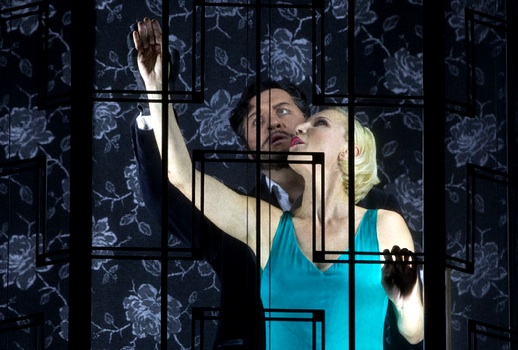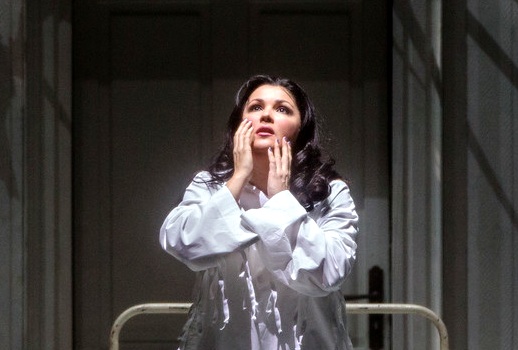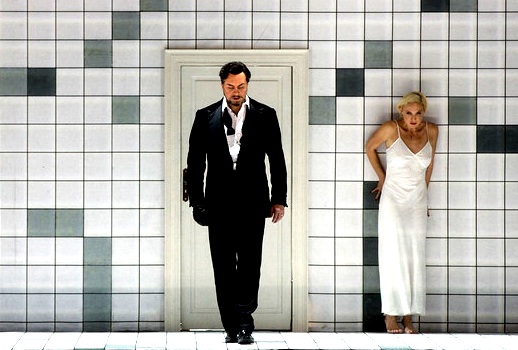
So, on to Iolanta. They came, they sang, they bowed. Anna Netrebko and Piotr Beczala are audience favorites, and so of course there were bravos and bouquets. Then, at the end of the performance a man just strolled onstage using the stage right stairs, and unveiled a poster of of the Ukraine flag with pictures of Valery Gergiev, Netrebko… and Hitler. The cast was clearly frazzled (although they were singing behind a production scrim) and the crowd began to boo the intrepid protestor. Almost as if on cue professional photographers ran down the aisle snapping pictures. And just as calmly, the man walked offstage.
The protestor I think earned the Iolanta cast some sympathy points. That was handy, because the performance was sort of disappointing. Tchaikovsky’s last opera has been a favorite vehicle for Netrebko in concert, and she’s sung this role onstage in the exact same production. I won’t point out the link but a whole performance is easily searchable on youtube. Maybe it’s sentimentality that’s kept this role in Netrebko’s repertoire because at the point in her career neither her voice nor her stage appearance really suit the role of the sheltered, blind princess. Netrebko’s now rather mature looking and what’s more, acts mature. The youthful ebullience is no longer really there. When she rolled around on the floor and twirled it almost seemed like a nostalgic throwback to her earlier days. It didn’t look natural.Her voice has also changed. She always had a dark, rich timbre, but in this rather lyrical role one noticed a thickness to her voice that sounded matronly. It had a slight but persistent beat on sustained notes. Her pitch sagged. What was most surprising was how often she seemed to be pushing. In the past, Netrebko didn’t have to strain to be loud. She just had reserves of volume. It was like she opened her mouth, and the sound filled the auditorium. Tonight in the duet with Vaudémont (Beczala) and in the final wedding chorus she was hunched over, fists balled, screaming. I really want to think this was just a bad night for Anna, because I’ve heard her in almost everything she’s ever sung at the Met and she’s never sounded this bad. And she was spectacular as Lady Macbeth this past fall.
Beczala is actually five years older than Netrebko but is still believable in these lyric prince roles. His voice is for the most part an incredibly well preserved light tenor. On the highest notes one can detect a thinning of the sound and some strain, but the core of his voice has stayed the same. More amazing is that he can still pull off the ardent lover schtick. If Netrebko’s voice is a bit like an aged fine wine, Beczala is more like amber. You can pull out videos from more than 10 years ago, and compare them with today. He hasn’t changed. And when you saw him smirking a little after the ovation for his aria it was so cute. Never change!

Gergiev has remarkably little feel for Tchaikovsky’s music. This is as much of a problem in the Nutcracker recording of his as Iolanta. He has a cold clinical style, which is absolutely against the grain of Tchaikovsky’s melodies. The final wedding chorus fizzled out to the point where when the curtain fell there was little to no applause.
Mariusz Trelinski’s production of Iolanta was the lesser of his two efforts. It’s set in a chilly hunting lodge, with some deer hanging on the walls and a dead deer that drips blood. I liked the austere look for most of the opera. It suggested a bone-chilling Russian winter. The stage blocking was formulaic and the “transformation” however pretty lame. Everyone just put on some wedding gear and held hands and belted.
After the intermission we got the grim aftermath to the fairy tale ending of Iolanta. Bartok’s Bluebeard’s Castle is not as easy and accessible a work as Iolanta. It has only two voices, and the story is dark and creepy. With that being said, I loved it. First, Trelinski apparently saved all his good ideas for Bluebeard. The production was surreal, imaginative, and almost cinematic. I won’t spoil many of the production’s effects (the way he handles the Seventh Key is a doozy) but let’s just say it’s a scene Ted Bundy might have approved of, in his sick sociopath way.

Petrenko and Michael don’t have A-list voices but they did throw themselves into the production completely. This opera has a rather abstract libretto but Petrenko and Michael made the characters flesh and blood people. He bond between husband and wife was well developed. There was tenderness, sexual attraction, fear, and finally, a chilling acceptance. Bartok’s score is “difficult” but deeply rewarding. I loved how the music became less dissonant with each door. The seventh door music was almost like Tchaikovsky. Death never seemed so seductive. It was a wonderful musical experience, and what I’ll most remember from the night.
Trelinski said Alfred Hitchcock films inspired him when he planned these productions. With this insight in mind I’ll just say that Hitch would have called the Iolanta half (replete with the noisy protestor) the MacGuffin. The lush music, fairy tale marriage story, and curtain call antics were just a trick for the audiences to appreciate the bone-chilling story of Bluebeard and his doomed wives.
Photos: Marty Sohl/Metropolitan Opera



